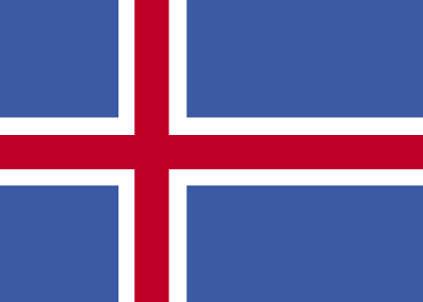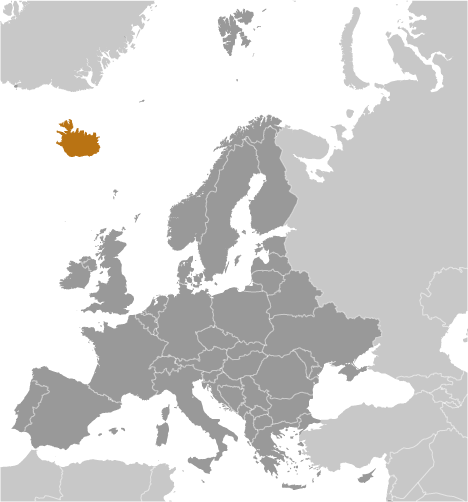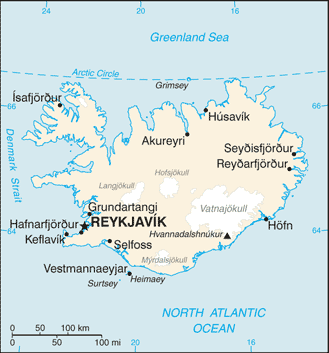Settled by Norwegian and Celtic (Scottish and Irish) immigrants during the late 9th and 10th centuries A.D., Iceland boasts the world's oldest functioning legislative assembly, the Althing, established in 930. Independent for over 300 years, Iceland was subsequently ruled by Norway and Denmark. Fallout from the Askja volcano of 1875 devastated the Icelandic economy and caused widespread famine. Over the next quarter century, 20% of the island's population emigrated, mostly to Canada and the US. Limited home rule from Denmark was granted in 1874 and complete independence attained in 1944. The second half of the 20th century saw substantial economic growth driven primarily by the fishing industry. The economy diversified greatly after the country joined the European Economic Area in 1994, but Iceland was especially hard hit by the global financial crisis in the years following 2008. Literacy, longevity, and social cohesion are first rate by world standards.
Population
308,910 (July 2010 est.)
Country comparison to the world:178
Nationality
Noun:Icelander(s)
Adjective:Icelandic
Ethnic groups
homogeneous mixture of descendants of Norse and Celts 94%, population of foreign origin 6%
Religions
Lutheran Church of Iceland 80.7%, Roman Catholic Church 2.5%, Reykjavik Free Church 2.4%, Hafnarfjorour Free Church 1.6%, other religions 3.6%, unaffiliated 3%, other or unspecified 6.2% (2006 est.)
Languages
Icelandic, English, Nordic languages, German widely spoken
Country Name
Conventional long form:Republic of Iceland
Conventional short form:Iceland
Local long form:Lydveldid Island
Local short form:Island
Government Type
constitutional republic
Capital
Name:Reykjavik
Geographic coordinates: 64 09 N, 21 57 W
Time difference: UTC 0 (5 hours ahead of Washington, DC during Standard Time)
Administrative divisions
8 regions; Austurland, Hofudhborgarsvaedhi, Nordhurland Eystra, Nordhurland Vestra, Sudhurland, Sudhurnes, Vestfirdhir, Vesturland
Independence
1 December 1918 (became a sovereign state under the Danish Crown); 17 June 1944 (from Denmark)
National Holiday
Independence Day, 17 June (1944)
Constitution
16 June 1944, effective 17 June 1944; amended many times
Legal system
civil law system based on Danish law; has not accepted compulsory ICJ jurisdiction
Suffrage
18 years of age; universal
Executive branch
Chief of state:President Olafur Ragnar GRIMSSON (since 1 August 1996)
Head of government:Prime Minister Johanna SIGURDARDOTTIR (since 1 February 2009);
Cabinet: Cabinet appointed by the prime minister
(For more information visit the World Leaders website)
Elections:president, a largely ceremonial post, elected by popular vote for a four-year term (no term limits); election last held on 28 June 2004 (next to be held in June 2012); following legislative elections, the leader of the majority party or the leader of the majority coalition usually the prime minister
note: the presidential election of 28 June 2008 was not held because Olafur Ragnar GRIMSSON had no challengers; he was sworn in on 1 August 2008
2004 election results: Olafur Ragnar GRIMSSON elected president; percent of vote - Olafur Ragnar GRIMSSON 85.6%, Baldur AGUSTSSON 12.5%, Astthor MAGNUSSON 1.9%;
Legislative branch
unicameral Parliament or Althing (63 seats; members elected by popular vote to serve four-year terms)
Elections:last held on 25 April 2009 (next to be held in 2013)
Election results:percent of vote by party - Social Democratic Alliance 29.8%, Independence Party 23.7%, Left-Green Movement 21.7%, Progressive Party 14.8%, Citizens' Movement 7.2%, other 2.8%; seats by party - Social Democratic Alliance 20, Independence Party 16, Left-Green Alliance 14, Progressive Party 9, Citizens' Movement 4
note: the Citizens' Movement disintegrated in September 2009; three of its former MPs are now represented under the banner of The Movement and the fourth former MP is an independent
Judicial branch
Supreme Court or Haestirettur (justices are appointed for life by the Minister of Justice); eight district courts (justices are appointed for life by the Minister of Justice)
Political Parties and Leaders
Independence Party or IP [Bjarni BENEDIKTSSON, Jr.]; Left-Green Movement or LGM [Steingrimur SIGFUSSON]; Progressive Party or PP [Sigmundur David GUNNLAUGSSON]; Social Democratic Alliance or SDA [Johanna SIGURDARDOTTIR]; The Movement [Birgitta JONSDOTTIR]
International organization participation
Arctic Council, Australia Group, BIS, CBSS, CE, EAPC, EBRD, EFTA, FAO, FATF, IAEA, IBRD, ICAO, ICC, ICCt, ICRM, IDA, IFAD, IFC, IFRCS, IHO, ILO, IMF, IMO, IMSO, Interpol, IOC, IPU, ISO, ITSO, ITU, ITUC, MIGA, NATO, NC, NEA, NIB, NSG, OAS (observer), OECD, OPCW, OSCE, PCA, Schengen Convention, UN, UNCTAD, UNESCO, UPU, WCO, WFTU, WHO, WIPO, WMO, WTO
Diplomatic representation in the US
Chief of mission: Ambassador Hjalmar W. HANNESSON
Chancery: House of Sweden, 2900 K Street NW #509, Washington, DC 20007
Telephone:[1] (202) 265-6653
FAX:[1] (202) 265-6656
Consulate(s) general:New York
Diplomatic representation from the US
Chief of mission:Ambassador (vacant); Charge d'Affaires Samuel WATSON
Embassy:Laufasvegur 21, 101 Reykjavik
Mailing address: US Department of State, 5640 Reykjavik Place, Washington, D.C. 20521-5640
Telephone:[354] 562-9100
FAX:[354] 562-9118
Flag description
blue with a red cross outlined in white extending to the edges of the flag; the vertical part of the cross is shifted to the hoist side in the style of the Dannebrog (Danish flag); the colors represent three of the elements that make up the island: red is for the island's volcanic fires, white recalls the snow and ice fields of the island, and blue is for the surrounding ocean










